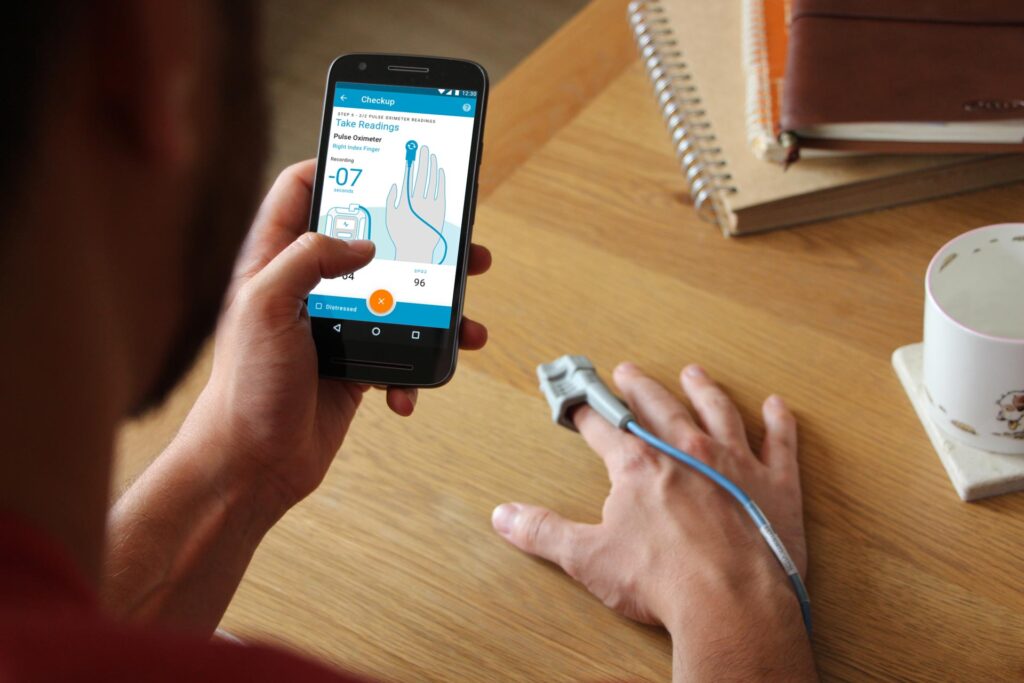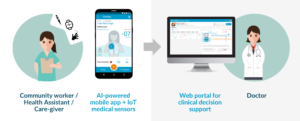
August 19th 2020
Havering Care Homes operates two care homes and one of them, Abbcross Nursing Home in Essex, is taking part in a project to trial technology that uses artificial intelligence for early detection of health issues.
Background
Mike Armstrong is the Managing Director of Havering Care Homes. He explains that they’ve always been interested in finding technology to help improve care.
Mike says:
“We’ve been using technology for several years including care planning software, video conferencing and remote access. When we heard about the technology bringing medical devices and machine learning into care homes, we really wanted to give it a go.”
With the help of Care City, an innovation centre, Mike brought on board a further 13 care homes in the wider community to pilot the project. Both residential and nursing homes are now trialling the new technology called Feebris.
Feebris was originally developed to diagnose pneumonia in children in India, where it is the number one killer of children under the age of 5.
Launched in February 2020 in the UK, it’s now being used in social care to help providers to do their own regular health monitoring of residents with chronic or acute conditions. The aim is to support triage in the care home and remote GP decision-making to avoid unnecessary hospital admissions.
How it works
The Feebris kit is made up of a smartphone and medical-grade digital devices including a thermometer, blood pressure cuff, stethoscope and pulse oximeter. Senior carers who aren’t medically trained are taught how to use the kit to take observations in six steps via Feebris’ app.
“Nurses are still at the forefront of care,” explains Mike. “But it does give carers additional skills and helps spread the workload. During the Covid-19 pandemic, two of our nurses were at high risk, so our senior carers have been able to step in and take obs.”
High quality recordings are gathered, such as lung sounds, and heart rate and oxygen saturation are also measured. These observations feed into the app on a mobile device which uses artificial intelligence and machine learning algorithms to detect any deterioration.
The app provides the carer with a post-examination summary and recommendations based on nationally recognised guidelines, such as the National Early Warning Score 2 (NEWS2).
Mike explains:
“It helps to reduce the stress and anxiety of the resident, it reassures staff they are making the right decisions, plus it also helps us to articulate information to the GP.”
 GPs can log into a portal remotely to check the observations and make judgements about a person’s care. The portal has been used by GPs to support other telephone or video interactions. This allows the GP to triage the individual and only visit when necessary.
GPs can log into a portal remotely to check the observations and make judgements about a person’s care. The portal has been used by GPs to support other telephone or video interactions. This allows the GP to triage the individual and only visit when necessary.
Every observation taken helps improve the baseline figures, so the technology knows what is normal for the individual and adapts accordingly.
When carers at the home began to use the technology, a set of observations would take 15 minutes. But with additional use, carers can now complete them in under 10 minutes.
Working together
The team working on the pilot have been able to pull together rapidly to get this trial underway.
The homes first met on 20 March and funding was quickly aligned with TechForce 19 (an NHSX COVID-19 response initiative, supported by PUBLIC and the AHSN network), Barking and Dagenham, Havering and Redbridge CCGs, and Care City. The project then went live on 4 May.
Mike says:
“The pandemic has been challenging, but what it has done is bring providers together to quickly work on solutions.”
The pilot is due to run until October. Mike says that the trial has been successful so far and he hopes it will continue.
Mike is now working with Feebris and his care planning software supplier, Person Centred Software, to coordinate the two systems and streamline care planning and reporting.
Lessons learnt
- Adoption of this kind of tech is easier if you have implemented technology solutions previously
- Work with your local GP surgery or GP federation and get them onboard at an early stage
- Implementation and getting buy-in from staff will take time, but the benefits will be worth it in the long run.
Further information
For more information about the pilot project and Havering Care Homes, please contact Mike Armstrong on [email protected] or visit their website www.haveringcare.co.uk
To find out more about Feebris, please go to www.feebris.com or email [email protected]
View all case studies